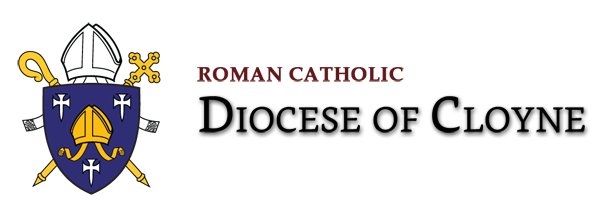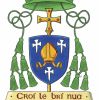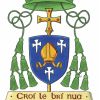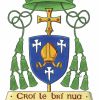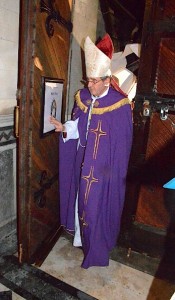
Bishop William Crean opening the Door of Mercy in St Colman’s Cathedral, Cobh, Dec 12th 2015.
The origin of the Christian Jubilee goes back to biblical times. The Law of Moses prescribed a special year for the Jewish people: “You shall hallow the fiftieth year and proclaim the liberty throughout the land, to all its inhabitants; it shall be a jubilee for you when each of you shall return to his property and each of you shall return to his family. . . . The jubilee is to be a holy thing to you, you will eat what comes from the fields”(Leviticus 25:10-14). The trumpet with which this particular year was announced was a goat’s horn called Yobel in Hebrew. This word is the origin of the English word Jubilee. In the New Testament, Jesus presents himself as the One who brings the old Jubilee to completion, because he has come to “preach the year of the Lord’s favour” (Luke 4:19; cf. Isaiah 61: 1-2).
For Catholics, a Jubilee Year can also be called a Holy Year, not only because its beginning is marked with solemn holy acts, but also because its purpose is to encourage holiness of life. It is convoked to strengthen faith, encourage works of charity and communion within the Church and in society, and to call Christians to be more sincere and coherent in their faith. It is very much a year dedicated to pilgrimage, to the forgiveness of sins, to holiness and conversion of life, and to receiving the Sacrament of Reconciliation. Above all, a Jubilee brings us into deeper relationship with Christ, who is the way, the truth and the life.
An important aspect of a Holy Year is the Holy Door. Men and women of faith are invited to pass through a Holy Door which will be in every Cathedral and in a number of other Churches around the world. Passing through the Holy Door is a reminder of “passing through” this world, and a reminder of being a pilgrim follower of Christ who identifies himself as “the door.” Pope St John Paul II once stated that the Holy Door “…evokes the passage from sin to grace which every Christian is called to accomplish.” Consequently, Jesus says He is “the door” (John 10:7) in order to make it clear that “no one can come to the Father except through Him” (John 14:6).
To pass “from outside,” through the door, and into God’s house is to pass from this world into the presence of God, just as in the Temple of Jerusalem, the High Priest on the Feast of Yom Kippur passed through the veil covering the doorway of the Holy of Holies to enter into the presence of God and offer the sacrifice of atonement. Moreover, to pass through the door is to confess with firm conviction that Jesus Christ is the Son of God, the Lord, and the Saviour who suffered, died, and rose for our salvation. With great courage, a person freely decides to cross the threshold leaving behind the kingdom of this world so as to enter the new life of grace in the kingdom of God.
As we consider the holy door and particularly in this Holy Year, our Lord stands at the door of our hearts knocking. We must open the door of our hearts to Him and cross the threshold of hope, striving for holiness. “I stand at the door and knock” (Rev 3:20).
The Jubilee Year of Mercy begins on Tuesday, December 8, 2015 (Solemnity of the Immaculate Conception) and concludes on Sunday, November 20, 2016 (Solemnity of our Lord, Jesus Christ, King of the Universe). The motto for the Year of Mercy is “Merciful like the Father.”
To know more about the purpose of the Jubilee of Mercy, see * Pope Francis’ letter introducing the year. It is called Misericordiae Vultus. It was issued on 1st September 2015.
* Pope Francis Message for World Youth Day 2016 in Krakow, Poland. It was issued on 15th August 2015.
These are available on Vatician website http://w2.vatican.va
